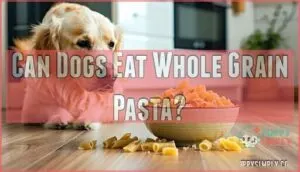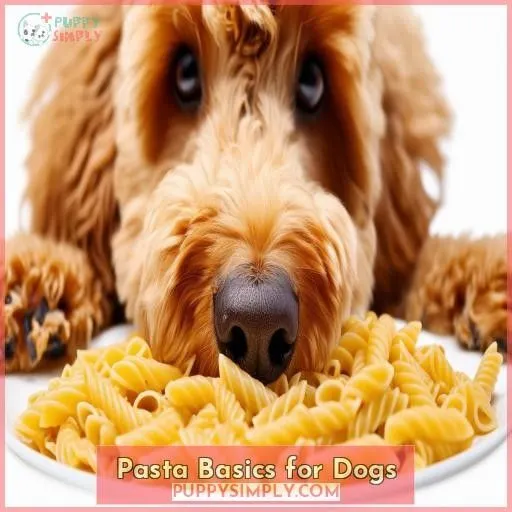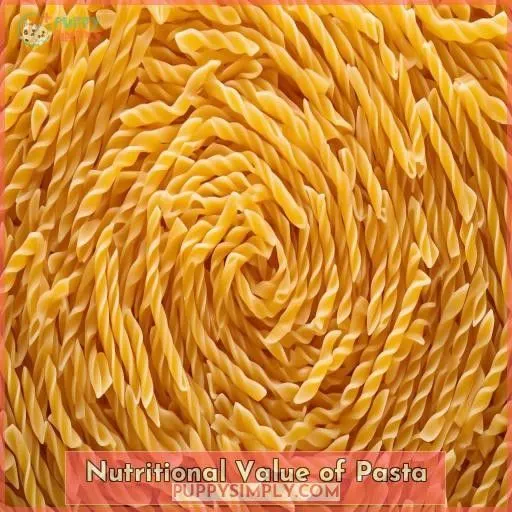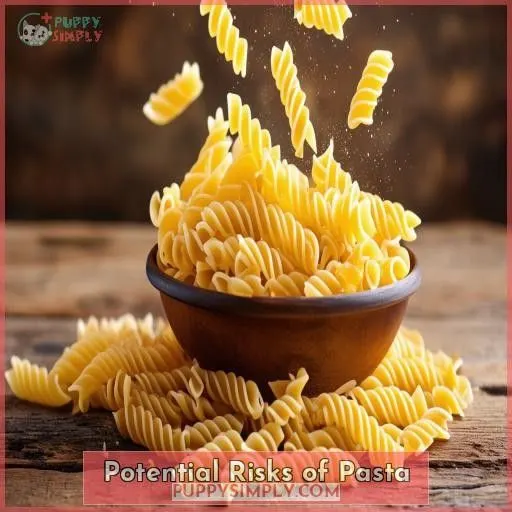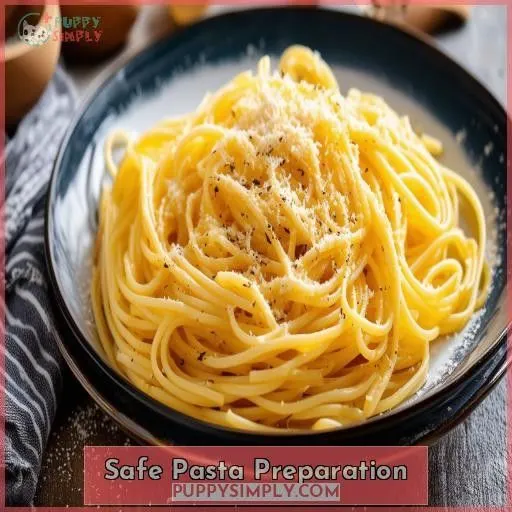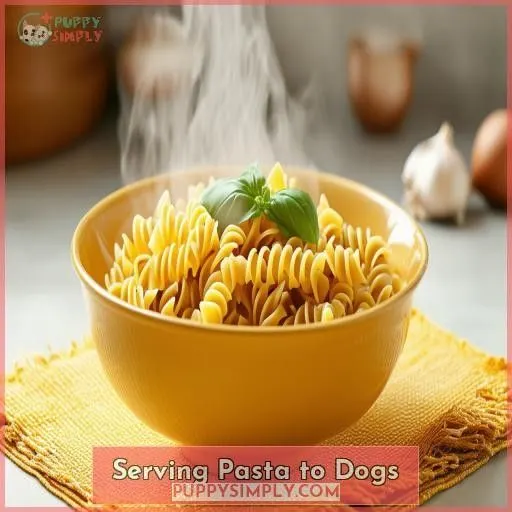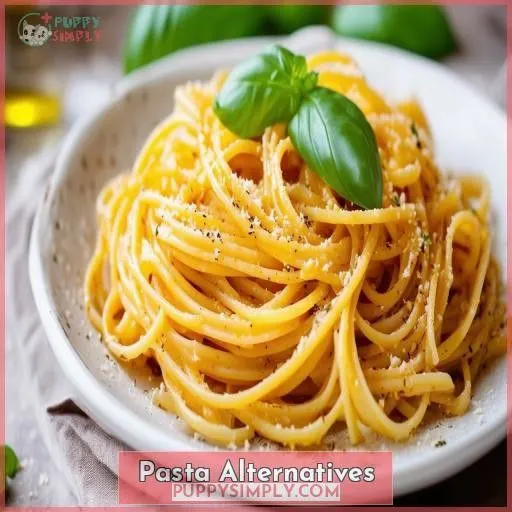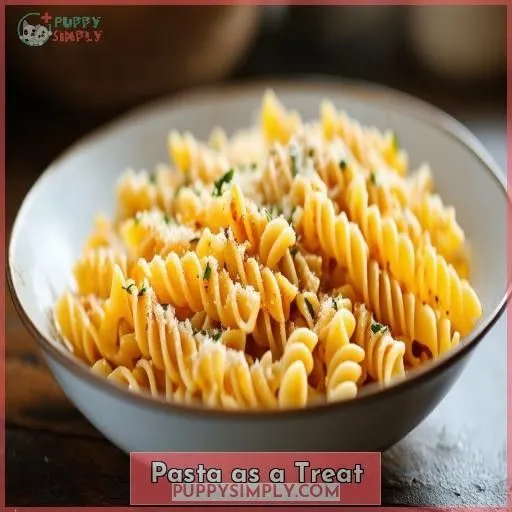This site is supported by our readers. We may earn a commission, at no cost to you, if you purchase through links.
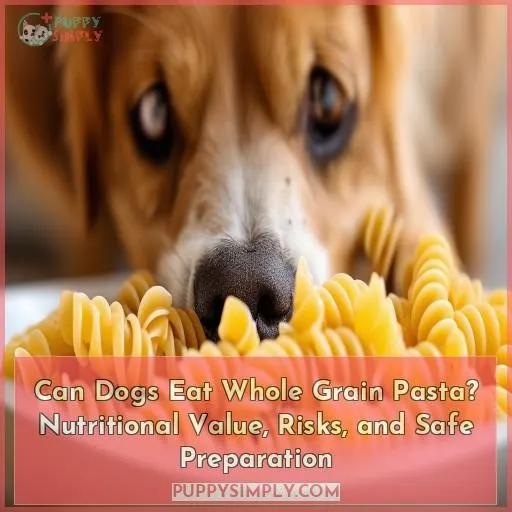
But remember, moderation is key – too much can lead to weight gain or digestive upset. When preparing, cook it plain without any toxic ingredients like onions or garlic. Let it cool completely before serving bite-sized portions as an occasional treat.
If Fido has any food sensitivities, stick to simple whole grains like brown rice instead.
Want to learn the best ways to incorporate pasta safely into your pup’s diet? Keep reading for expert tips!
Table Of Contents
- Key Takeaways
- Can Dogs Eat Whole Grain Pasta?
- Pasta Basics for Dogs
- Nutritional Value of Pasta
- Potential Risks of Pasta
- Safe Pasta Preparation
- Serving Pasta to Dogs
- Pasta Alternatives
- Pasta as a Treat
- Consulting a Veterinarian
- Frequently Asked Questions (FAQs)
- What kind of pasta can dogs eat?
- Is whole grain OK for dogs?
- Can you feed dogs pasta instead of rice?
- Is pasta hard for dogs to digest?
- Can dogs eat pasta with cheese sauce?
- How much pasta can a dog eat?
- Is whole wheat pasta better for dogs?
- Can pasta be part of a dogs diet?
- Do all dogs digest pasta the same way?
- Conclusion
Key Takeaways
- Whole grain pasta can be an occasional tasty treat for Fido, packed with fiber and nutrients to keep his tail wagging. Just like us humans, moderation is key to preventing any tummy troubles or unintended pudge for our furry friends.
- Plain is the way to go when preparing pasta for pups – hold the garlic, onions, and heavy sauces that could spell disaster for sensitive doggy digestive systems. Consider it pasta al dente, hold the ingredients that could cause a ruckus.
- Every dog is unique, so keep a watchful eye for any signs of digestive distress or allergic reactions when introducing new foods like pasta. Trust your gut (and your pup’s) to ensure a pasta party, not a potty party.
- If your pooch has any special dietary needs or underlying health conditions, always consult your trusty vet before serving up a pasta feast. They know Fido’s quirks and can guide you on the paw-fect portions and preparations.
Can Dogs Eat Whole Grain Pasta?
Yes, dogs can eat whole grain pasta in moderation. While pasta isn’t toxic for dogs, it should be served in small portions as an occasional treat due to its high carbohydrate and calorie content.
Pasta Basics for Dogs
When considering pasta for your dog, it’s key to understand the basics. Dogs can safely eat plain pasta in moderation, but avoid noodles with harmful ingredients like garlic, onions, or heavy sauces .
Whole grain pasta is preferable due to its higher fiber content, offering a nutritious option compared to refined pasta.
For safe consumption, make certain the pasta is cooked thoroughly and cooled; uncooked pasta can be a choking hazard (Source).
Start by introducing small quantities and monitor your dog for any signs of pasta allergies or digestive issues (Source).
Use pasta recipes designed specifically for dogs, pairing pasta with lean proteins for a balanced diet.
Proper pasta storage ensures it remains fresh and safe for your pet.
Nutritional Value of Pasta
When deciding to feed your dog pasta, it’s important to know the difference between whole grain and refined options. Whole grain pasta is richer in fiber and essential nutrients, while refined pasta offers higher iron and B vitamins but may lack other health benefits .
Whole Grain Vs. Refined
Whole grain pasta for dogs is rich in fiber, offering better nutrient density than refined pasta. It has a lower glycemic index, which can help manage blood sugar. Whole grain contains resistant starches and soluble dietary fiber, promoting a healthy gut microbiome. For dogs with gluten sensitivity, opt for alternative flours like rice or quinoa (Source).
Carbohydrates and Calories
Whole wheat pasta is rich in complex carbohydrates and has a moderate glycemic index, making it a nutritionally balanced choice for dogs. It’s a good source of calories, offering sustained energy. Cooked pasta, especially whole wheat, provides dietary fiber and essential nutrients, supporting overall health while aligning with a responsible, balanced diet.
Potential Risks of Pasta
Feeding dogs whole grain pasta can lead to digestive issues, particularly if they’ve sensitive stomachs or food allergies. Additionally, it can contribute to obesity and weight gain if given in large amounts or too frequently.
Digestive Issues
Pasta might trigger digestive issues in dogs with food sensitivities, including gastrointestinal distress, vomiting, or pancreatitis. Consider these points:
- Monitor for lactose intolerance when feeding pasta with cheese.
- Avoid sauces with toxic ingredients.
- Make certain pasta is cooked and plain.
- Introduce slowly to check for sensitivities.
- Remember, moderation is key to prevent gut-brain axis disruptions.
Obesity and Weight Gain
Another concern with feeding pasta to dogs is the risk of weight gain and obesity. Pasta is high in carbohydrates and calories, so you’ll want to limit portions as treats. Excessive pasta consumption can lead to health problems like diabetes and joint issues in dogs. For a nutritionally complete food, opt for high-quality dog kibble or a vet-approved homemade diet.
Safe Pasta Preparation
To prepare pasta safely for your dog, cook it plainly without adding any seasonings, sauces, or other ingredients that could be toxic, such as garlic, onions, or high levels of salt. Once cooked, allow the pasta to cool completely before serving to prevent burns or choking hazards.
Cooking Methods
You’ll want to cook whole grain pasta thoroughly to make sure it’s safe for your pup. Follow package instructions for perfect al dente texture. Avoid sauces with toxic ingredients like garlic or onions. Let cooked pasta cool completely before portioning into bite-sized pieces for easy digestion. Controlled portions prevent excess calories and weight gain.
Avoiding Toxic Ingredients
You’ll want to steer clear of any pasta sauces or added ingredients containing garlic, onions, butter, or dairy products, as these can trigger allergic reactions or digestive issues in dogs. Uncooked pasta poses a choking hazard, while pasta coated in tomato sauce may cause skin irritation. If concerned about lactose intolerance, avoid cheesy pasta dishes.
Serving Pasta to Dogs
When serving pasta to your dog, it’s essential to monitor portion sizes and keep an eye out for any adverse reactions. Offer only small amounts as an occasional treat, and watch for signs of digestive distress like vomiting or diarrhea, which may indicate your dog can’t tolerate pasta well.
Portion Control
When serving pasta to dogs, portion control is essential. Offer only small amounts as an occasional treat, not a meal replacement. As a general guideline, pasta should make up no more than 10% of your dog’s daily caloric intake. Measure portions carefully, and avoid high-fat pasta sauces or toppings like cheese.
Monitoring for Reactions
After serving a small portion of plain pasta, you’ll want to monitor your pup closely for:
- Allergic reactions (itching, hives, vomiting)
- Digestive issues (diarrhea, gas, abdominal pain)
- Choking hazards (gulping without chewing)
If any concerning symptoms arise, discontinue feeding pasta and consult your vet immediately.
Pasta Alternatives
While pasta can be an occasional treat for dogs, it’s important to offer more nutritious alternatives like lean proteins and vegetables. These foods provide essential nutrients and fiber that support your dog’s overall health without the potential risks associated with excessive carbohydrate intake.
Lean Proteins
If pasta isn’t suitable, offer lean proteins like turkey or liver. They provide amino acids for muscle growth and satiety. DIY nutrient blends or prescribed diets balance nutrients. For example, a ground turkey dog food recipe provides complete nutrition while avoiding pasta’s drawbacks for sensitive dogs needing customized diets.
Fruits and Vegetables
In addition to lean proteins, you can offer your pup fruits and veggies as healthier alternatives to pasta. Try these nutrient-dense options:
- Sweet potatoes (fiber, vitamins)
- Green beans (low-calorie, vitamins)
- Blueberries (antioxidants, fiber)
- Carrots (vitamins, minerals)
Mixing things up with occasional produce treats provides variety while nourishing your furry friend.
Pasta as a Treat
While whole grain pasta can be an occasional treat for dogs, moderation is key to avoid excess calories and digestive issues. You can make homemade dog treats using whole wheat pasta, cooked plainly without salt or sauce, and cut into small pieces for portion control.
Moderation is Key
While pasta can be an occasional treat for dogs, moderation is critical. Monitor for pasta allergies or intolerances. Like the ancient Greek physician Hippocrates said, All things in moderation. Offer small quantities infrequently to avoid weight gain. Pasta recipes for homemade dog treats can provide appropriate portion control.
Homemade Dog Treats
You can make homemade dog treats with whole grain pasta too! It’s a fun way to treat your pup while incorporating healthy ingredients. Here are some ideas:
- Dehydrated pasta treats
- Pasta cookies with peanut butter and oats
- Frozen yogurt pasta pops
Just remember, treats should make up no more than 10% of your dog’s daily calories. For healthier options, consider lean proteins, fruits, and veggies instead.
Consulting a Veterinarian
When introducing whole grain pasta to your dog’s diet, it’s essential to consult your veterinarian, especially if your furry friend has any underlying health conditions or special dietary needs. Your vet can provide personalized guidance on whether whole grain pasta is appropriate, recommend portion sizes, and suggest alternatives if necessary.
Underlying Health Conditions
If your dog has underlying health issues like allergies, gluten intolerance, or pancreatitis, you should consult your vet before feeding them pasta. They may recommend a grain-free diet or advise against pasta altogether to prevent bloat or digestive problems. Your vet knows your dog’s medical history and can provide specific guidance.
Special Dietary Needs
If your dog has special dietary needs due to health issues or breed sensitivities, you’ll want to consult your vet before introducing whole grain pasta. Specific diets may be necessary for conditions like diabetes, kidney disease, or allergies. Your vet can guide you on appropriate portions and preparations based on your pup’s age and individual requirements.
Frequently Asked Questions (FAQs)
What kind of pasta can dogs eat?
You can safely give your dog plain, cooked whole wheat pasta as an occasional treat in moderation. Avoid sauces or other toppings that may contain harmful ingredients.
Is whole grain OK for dogs?
Whole grain pasta is a paw-fect choice for your pup! It’s packed with fiber to keep their gut healthy and their tail wagging. Just remember, moderation is key – a small portion as an occasional treat will have Fido begging for more.
Can you feed dogs pasta instead of rice?
You can feed dogs pasta instead of rice, but whole wheat is best for added fiber and nutrients. Moderation is key, as too much pasta can cause weight gain. Consider mixing pasta with protein and veggies for a balanced meal.
Is pasta hard for dogs to digest?
Imagine Buddy struggling with an upset tummy after gobbling up leftover pasta. Yes, pasta can be hard for dogs to digest – all that starch is no walk in the park for their sensitive digestive systems. Small portions are key for their gut health.
Can dogs eat pasta with cheese sauce?
No, you shouldn’t feed dogs pasta with cheese sauce. The high-fat, high-sodium sauce can cause digestive issues and potential pancreatitis. Stick to plain, cooked pasta as an occasional treat.
How much pasta can a dog eat?
You should limit your dog to small portions of plain, cooked pasta as an occasional treat. Too much pasta can lead to weight gain and gastrointestinal issues in dogs. Consult your vet for appropriate serving sizes based on your dog’s size and dietary needs.
Is whole wheat pasta better for dogs?
The wholesome goodness of whole wheat pasta is a paw-fect choice for Fido’s diet. This fiber-packed treat nourishes furry bellies while lending a tasty twist to mealtime.
Can pasta be part of a dogs diet?
Sure, pasta can be an occasional treat in your dog’s diet when served plain and cooked. Just remember to limit portions as pasta is high in carbs and calories. Complement it with a balanced, protein-rich diet for proper nutrition.
Do all dogs digest pasta the same way?
No, not all dogs digest pasta equally. Some may have trouble with the fiber content or specific ingredients like wheat. It’s best to introduce pasta gradually and watch for any digestive issues. Every dog is different, so monitor their reaction carefully.
Conclusion
Like a well-crafted symphony, incorporating whole grain pasta into your dog’s diet requires careful consideration.
While this delectable treat can provide essential nutrients, overindulgence carries risks.
Moderation is the golden rule – consult your veterinarian, monitor portion sizes, and embrace pasta as an occasional reward.

